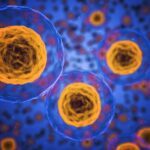Let’s find out what research says about it!

We all have the desire to maintain a healthy body weight. And to turn this into reality, we adopt different approaches that often involve drastic lifestyle changes or high financial costs.
For that reason, researchers are looking at natural ways of enhancing losing weight. One such way could be activating the autophagy process inside the body.
In this article, we’ll explore the possible role of autophagy in weight loss. In addition, we’ll also understand the benefits and risks of inducing the autophagy process.
So what’s autophagy?
Autophagy is a natural body process to maintain cellular health and function. It involves the breakdown and recycling of unnecessary cellular components to provide energy and building blocks for new cellular components.
The process is initiated when the cell is under stress caused by various factors. Some of these factors include nutrient deprivation, exercise, and fasting.
During autophagy, the target cellular components are first recognized and engulfed by a double membrane structure called an autophagosome. The autophagosome then delivers the cellular components to the lysosome, a specialized organelle responsible for digestion and waste disposal. The lysosomal enzymes degrade the contents of the autophagosome, and the resulting molecules are released back and reused by the cell.
Can autophagy help with weight loss??
Research is underway to explore different pathways and mechanisms that link autophagy to weight loss. As of now, there hasn’t been research-based evidence reported that could show that autophagy directly promotes weight loss in humans. Yet, some assumptions based on animal research indicate that it may encourage weight loss.
These are the following.
1. The breakdown of stored fat
Overeating calories expands your body fat stores, resulting in weight gain. Animal research suggests that autophagy helps in degrading the stored fats, thereby promoting weight loss.
For example, a study in mice shows that autophagy plays a crucial role in protecting against weight gain and fat toxicity. The researchers of the study found that autophagy activation reduced weight gain and protected against the adverse effects of high-calorie diets. They further confirmed that autophagy helped to prevent the accumulation of toxic lipids in the body, which can contribute to weight gain and the development of diabetes.
2. Suppression of chronic inflammation
Inflammation is critical to the body’s immune system’s response to injury and infection. Still, when it becomes chronic, it can contribute to the development of many severe health conditions, including obesity.
Several lines of research have revealed that autophagy directly regulates inflammation. Autophagy can selectively eliminate damaged organelles and misfolded proteins that can trigger inflammation and promote obesity.
Autophagy can also enhance the clearance of pathogens and damaged cells, reducing the risk of chronic inflammation.
Since chronic inflammation causes obesity, suppressing it by autophagy may promote weight loss. Yet, the research evidence favoring this notion is still missing.
Benefits and risks of inducing the autophagy process
Autophagy has gained increasing attention in recent years due to its potential health benefits, including neuroprotection, cancer prevention, improved immune function, and increased lifespan. However, inducing autophagy may also pose certain risks. Let’s shortly discuss these two opposing effects of autophagy.
Benefits of inducing autophagy
1. Neuroprotection: Autophagy protects neurons from damage and cell death via clearing out damaged proteins and organelles, reducing the accumulation of toxic substances that can harm neurons. And doing so protects us from developing brain diseases like Alzheimer’s and Parkinson’s.
2. Cancer prevention: Autophagy has been linked to the prevention and treatment of cancer. Recent evidence suggests that this protective role of autophagy is limited to the very early stage of cancer, during which the normal cells begin transforming into cancerous ones. In a later stage, it may have the opposite effects and promote cancer growth. As discussed above, autophagy also controls inflammation, a critical factor in cancer development.
3. Increased lifespan: Animal studies have shown that inducing autophagy can increase lifespan. Many different mechanisms are proposed for the anti-aging effects of autophagy. These include clearing out toxic proteins, protecting against oxidative stress, and improving mitochondrial function.
4. Improved immune function: Autophagy plays a crucial role in the proper functioning of the immune system. It helps to eliminate intracellular pathogens and supports the presentation of antigens to immune cells, leading to improved immune responses.
Risks of inducing autophagy
1. Autophagic cell death: Inducing autophagy can sometimes lead to cell death, known as autophagic cell death. This phenomenon occurs when your body cells overactivated the autophagy process, causing excessive degradation of cellular components crucial for cell survival.
2. Cancer promotion: As mentioned above, autophagy can promote cancer development under certain conditions. It can help cancer cells survive and adapt to stressful situations, such as chemotherapy or nutrient deprivation, allowing them to grow and spread.

